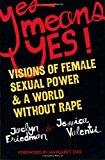Trigger Warning: Rape and (sexual and physical) violence
Recently I have been reading ‘Yes Means Yes‘, a collection of essays which talk about female sexuality and consent and how stereotypical visions of female sexuality contribute to a rape culture. It’s a powerful book. I had planned to get to the end and then talk about it overall as I would do with a book normally, but recently some of the articles have really been getting in my head and I feel like it might be better to write down some thoughts specifically on those articles. I probably won’t do this for every article but it seems like a better way to look at it, and I will do a sort of summery post when I’m completely done.
This is my second of these review/though posts for Yes Means Yes, you can read the first here

Killing Misogyny: A Personal Story of Love, Violence, and Strategies for Survival
-Cristina Meztli Tzintzún
Cristina grew up in a family which seemed stuck in a loop of misogyny. Her father cheated repeatedly on her mother, he was violent, on their first date he raped her, not even the first time she had been raped. Her aunt faced a similar fate, beaten by her father for being raped and later forced to marry her rapist.
Cristina vowed to break the chain, she would never let a man treat her as her family members had been treated. She started reading feminist literature, and became a self-proclaimed feminist. In her late teens she even wrote and had published an article about how she planned to break the chain of misogyny.
Then she met Alan. Alan seemed like the perfect man from first glance. He was a male feminist, and would get into discussions about feminism with Cristina. When their relationship became sexual he agreed to get tested for STIs before they had sex for the first time.
But things were not as they seemed. Cristina developed herpes from oral sex. Initially she refused to see Alan, but she believed that he would be the only one to give her attention knowing that she had an STI and she returned to him.
Over the next few years Alan and Cristina had an on again off again relationship. He would cheat on her, or give her and STI and she would leave him, but she couldn’t resist him and kept returning. She even went to a group for women like her, but they didn’t know about feminism and she didn’t feel a connection to them. Alan knew about feminism and she believed that he wanted to change, despite all the evidence to the contrary she thought she could be the one to change him.
Cristina has left Alan now, for good. She helps support women who are in the situation she was in. She says that she needed to experience that misogyny for herself to be able to understand it, to understand those who are trapped by it, and to do her best to defeat it.
That she has turned her life around is a hopeful message. It says you can change your life. You can get yourself out that hole. You might fall, but you can get up again. Or at least that is how it should be.
Somehow I find that hope hard to see. She kept returning, how can she be sure that this is it? Even her mother was disappointed with Cristina for leaving Alan, but she is stuck in the same life herself. I get that she doesn’t want that life for her daughter, but I find it hard to see why she stays. I know there probably is not one simple reason, but it seems to diminish the hope from Cristina’s own escape.
I have said before that I feel I’m privileged when it comes to my experiences as a woman, so maybe this is why I can’t see the hope in this story, because I have never experienced anything close to it (and I am thankful for that)?
What do you think? Am I missing the hope in this story? Does it have more power than I realize for the right people?
Feel free to comment anonymously on this post. It will go into a moderating queue but am unlikely not to approve it







